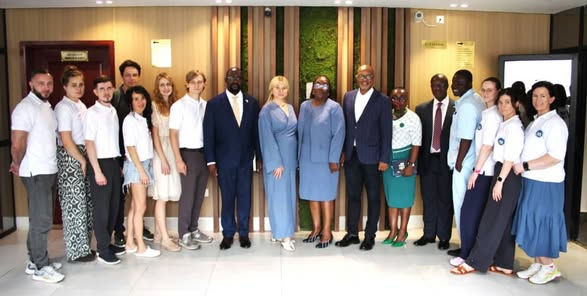Hon. Vice President Mohamed Juldeh Jalloh Launches Urban Heat Action Plan at the maiden African Urban Heat Summit.
- Aminata Turay SLENA Correspondent. Contact: +23299776914

- Feb 19
- 4 min read
In a bold step towards combating the escalating impacts of climate change, Sierra Leone’s Vice President, Dr. Mohamed Juldeh Jalloh, launched the Freetown Heat Action Plan at the maiden African Urban Heat Summit in Freetown. Held at the Radisson Blu Conference Centre on Thursday 6th February, 2025. The summit brought together leaders, experts, and citizens from across the continent to tackle one of Africa’s most pressing environmental challenges: extreme heat.
Hon Vice President Mohamed Juldeh Jalloh In his keynote address,welcomed distinguished guests, including delegates from the sub-region, policymakers, and partners from around the globe. He began by emphasizing on the significance of the summit and the pressing need for innovative solutions to address extreme heat, which has become a daily reality for millions of Africans. “Extreme heat is no longer a distant threat—it is a daily reality,” he said. “Cities like Freetown, with fast-growing urban populations, are seeing the impacts first-hand, from increased public health risks to disrupted energy supplies and reduced productivity.”
Drawing from his vast experience in the region, the Hon Vice President underscored the importance of resilience in the face of climate change. He outlined Sierra Leone’s ongoing efforts to build climate resilience, including the National Adaptation Plan and the National Climate Change Strategy, which provide comprehensive frameworks for tackling climate impacts. He also highlighted key initiatives such as the “Freetown the Tree Town Campaign,” which aims to plant millions of trees to help cool the city, improve biodiversity, and manage flooding risks.
“The work we do in Freetown is a shining example of nature-based solutions in action,” Jalloh said, emphasizing the role of green infrastructure in combating heat and mitigating the impacts of climate change.
The Vice President also highlighted several other government initiatives, such as the Integrated Urban Mobility Project, designed to improve public transportation and reduce the carbon footprint, and the Western Area Peninsula Forest Landscape Initiative, which focuses on improving vegetation to support environmental resilience.
Despite these efforts, Jalloh acknowledged that no single city or country could solve the challenges of extreme heat alone. “Sustainable solutions require collaboration,” he said, calling for partnerships among governments, the private sector, civil society, and development partners. He stressed the importance of sharing best practices, promoting innovative strategies, and finding solutions that are both ambitious and sustainable.
The Mayor of Freetown stressed the need to move from awareness to action in tackling extreme heat. She highlighted the impact of heat on public health and water access, as discussed by stakeholders such as market women, the Ministry of Environment, and climate partners. The Mayor emphasized that while the launch of the Urban Heat Action Plan is a significant step, successful implementation requires collaboration, funding, and policy support from the national government, including urban planning and tree protection reforms. She also underscored the importance of community involvement in transforming Freetown into a heat-resilient city through collective action across all sectors of society.
“Freetown is a living demonstration of the resilience we need to foster across our cities,” Jalloh said. “This summit will inspire bold action for transformative change.”
Abdu Muwonge Country Manager World Bank, highlighted the critical need for collaborative climate action. He further commended Freetown’s efforts, noting that the city is emulating strategies from cities like Johannesburg and Nairobi, where the community is actively involved in identifying local solutions to combat extreme heat. He stressed that nature-based solutions, such as enhancing green spaces and mangrove restoration, play a vital role in mitigating heat while emphasizing that climate action must be integrated with urban planning to be effective.
Furthermore, he underscored the importance of public transportation, noting that improving transit systems would not only reduce emissions but also alleviate the congestion that intensifies heat in cities like Freetown.
In addition to the remarks from global partners, Eugenia Kargbo Chief Heat Officer (Freetown), emphasized the need for inclusive, evidence-based solutions. Eugenia outlined the city’s approach to urban heat management, which includes working with vulnerable communities, particularly outdoor workers and street traders, who are disproportionately affected by extreme heat. The organization has conducted extensive community consultations and data collection to ensure that the Urban Heat Action Plan prioritizes the most at-risk groups. The plan, she noted, aligns with global climate goals and incorporates innovative approaches, such as hybrid and nature-based solutions to cool the city. Despite challenges like limited data and funding, Eugenia pointed out that initiatives like tree planting and improving infrastructure for market traders have already shown promise. Looking forward, she highlighted plans to expand the city’s heat monitoring efforts and deploy more cooling measures, underscoring the city’s commitment to sustainable, community-driven solutions.
The African Urban Heat Summit highlighted the urgency of building heat-resilient cities across Africa. Freetown’s launch of its Urban Heat Action Plan is a significant step in addressing extreme heat, focusing on community-driven solutions, nature-based interventions, and sustainable planning. Success will depend on collaboration among governments, private sectors, and local communities, alongside securing funding and supportive policies. Through innovation and collective action, African cities can create resilient environments that protect public health and wellbeing, turning the vision of heat-resilient cities into reality.
Aminata Turay
Office of the Vice President
099776914/




Comments